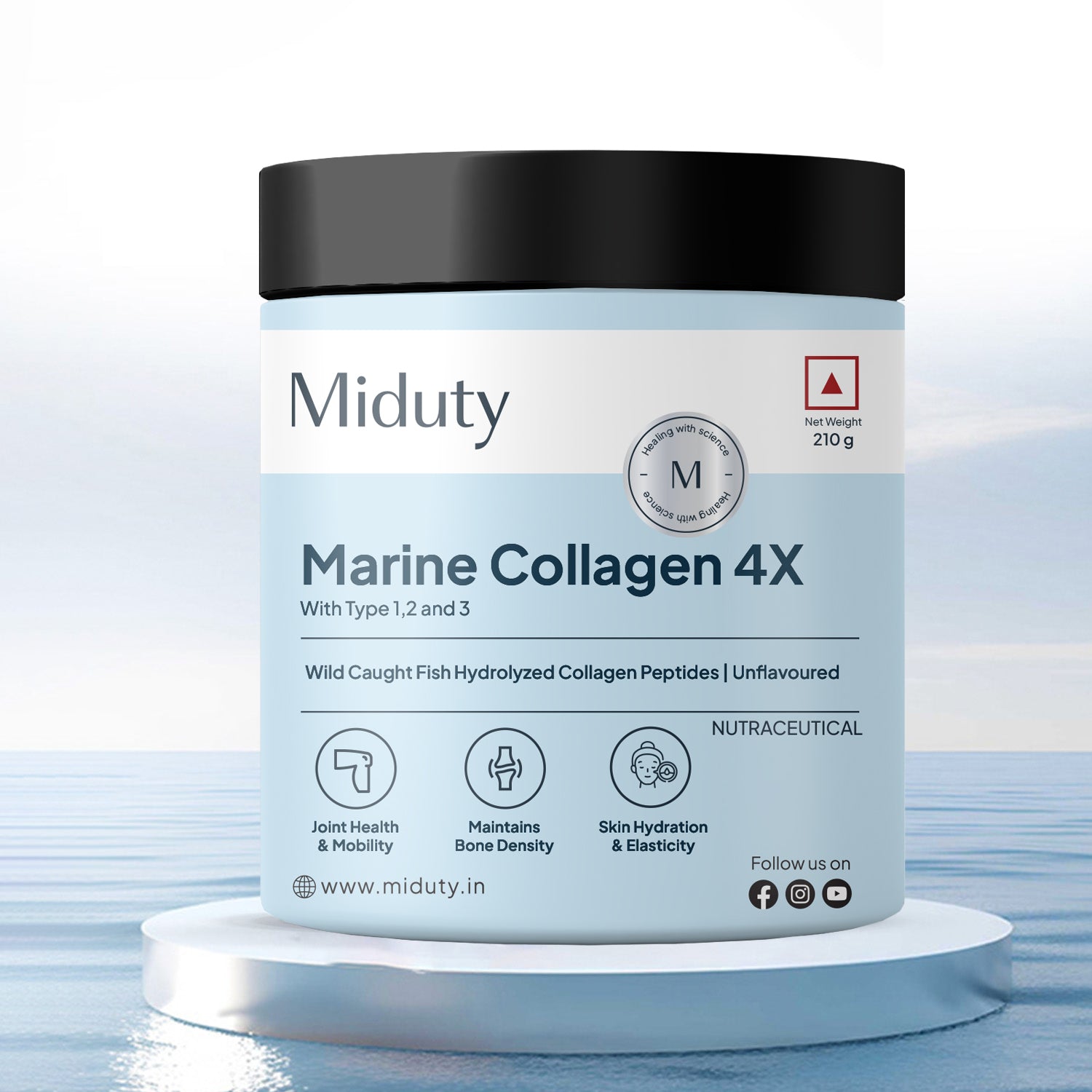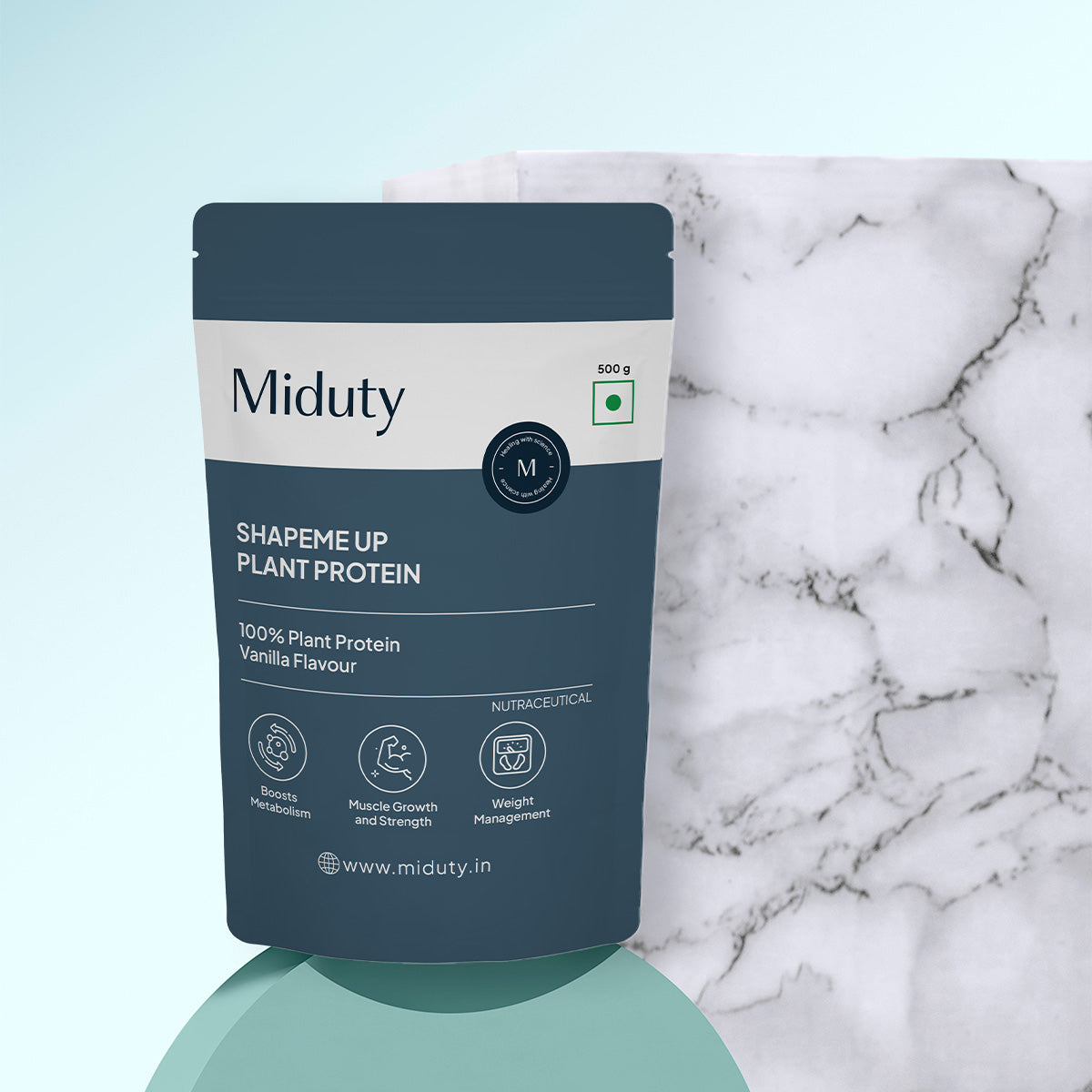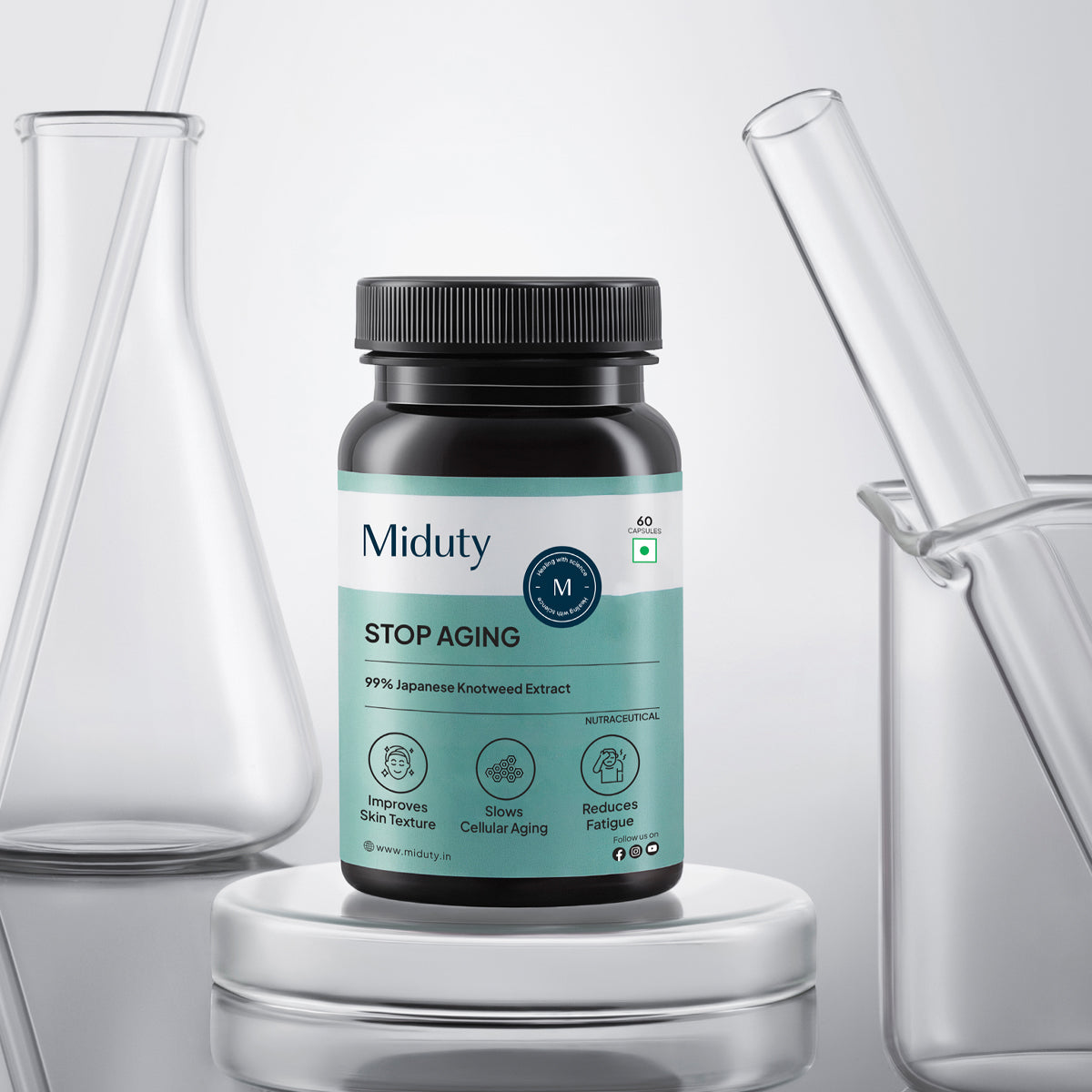
Collagen vs. Whey Protein: A Complete Guide For Choosing The Best One
Introduction
Have you ever wondered why some people love collagen for glowing skin, while others swear by whey protein for their post-workout boost? If you've found yourself confused about which one to choose, you're not alone. Collagen and whey are both popular protein options, but they serve different purposes. In this guide, you will get to know about each one in simple terms, which will help you decide which is best for you.
Key Takeaways-
1. Remember, about one-third of the protein in our bodies is collagen, so it's important to include it in your protein intake.
2. Type 1 is the most dominant one, and makes up more than 90% of the collagen in the body.
3. Discover how collagen, making up 30% of your total protein, supports not just your skin's elasticity and hydration but also your joints, bones, and even gut health.
4. Learn why hydrolyzed collagen is preferred over unhydrolyzed forms; its smaller, digestible fragments are key to maximizing skin and joint benefits.
5. Find out how whey protein, packed with all nine essential amino acids and rich in leucine, is essential for muscle repair, growth, and post-workout recovery.
Think about your goals. Are you dealing with dull, aging skin and want to feel confident in your natural glow? Or are you someone who hits the gym regularly and wants to crush your fitness goals? Your answer might point you toward collagen or whey. Or maybe you're like me and want the best of both worlds: healthy skin and strong muscles. Whatever your goal, understanding these proteins will help you make an informed decision that supports your lifestyle and well-being.
What Is Collagen Protein?
Collagen is the most abundant protein in your body, making up about 30% of your total protein content. It's found in your skin, connective tissues like tendons, ligaments, cartilages, and fascia, your bones, organs, blood vessels, musculoskeletal system, hair, nails, and even your gut. It provides structure to tissues and organs, with 28 types identified in the human body, with Types 1 to 5 being the most common. Type 1 is the most dominant one, and makes up more than 90% of the collagen in the body. You also need protein for the proper functioning of enzymes, hormones, and your immune system. Think of collagen as the "glue" that holds everything together. As we age, collagen production naturally declines, which can lead to wrinkles, sagging skin, and joint pain. That's why collagen supplements, usually derived from animal sources like bovine (cow) or marine (fish), are often marketed for skin health,
Research backs this up, too!
A study published in the journal Skin Pharmacology and Physiology found that women who took collagen supplements for 8 weeks experienced a significant improvement in skin elasticity and hydration. So, if you're looking to maintain youthful skin or keep your joints healthy, collagen might be your go-to protein.
What Is Whey Protein?
On the other hand, whey protein is a complete protein powerhouse. It's made from the liquid part of milk that separates during the cheese-making process. Packed with all nine essential amino acids, whey is particularly rich in leucine, a key amino acid for muscle growth. Whey protein also contains the master antioxidant glutathione. Glutathione is thought to play an important role in sarcopenia specifically, as patients with sarcopenia tend to have higher levels of oxidative stress.
This is why athletes and fitness enthusiasts love it when it's quick to digest and gives your muscles the fuel they need to recover and grow after a tough workout.
According to research published in the Journal of the International Society of Sports Nutrition, consuming whey protein after resistance training significantly enhances muscle protein synthesis, helping you build and repair muscles more effectively.
According to a forecast by Mordor Intelligence report, the collagen supplement market is expected to reach $8.59 billion by 2029.
Nutritional Profile Comparison
|
Aspect |
Collagen |
Whey Protein |
|
1. Amino Acid Profile |
Rich in glycine, proline, and hydroxyproline |
Contains all nine essential amino acids, including leucine. |
|
2. Complete Protein? |
No (lacks some essential amino acids). |
Yes (contains all nine essential amino acids). |
|
3. Primary Benefits |
- Supports skin elasticity, hydration, and reduces wrinkles. - Improves joint health and strengthens connective tissues. - May aid in gut health. |
- Promotes muscle repair, recovery, and growth. - Enhances strength when combined with resistance training. - Boosts the immune system with cysteine. |
|
4. Protein Per Serving |
Typically 10–20 grams. |
Typically 20–30 grams. |
|
5. Digestibility |
Slowly absorbed; ideal for long-term structural support. |
Quickly digested; provides instant amino acids for post-workout recovery. |
|
6. Specialized Amino Acids |
- Hydroxyproline: Strengthens skin and connective tissues. - Proline: Aids cartilage regeneration. - Glycine: Supports skin health and wound healing. |
- Leucine: Stimulates muscle protein synthesis. - Cysteine: Helps produce glutathione, a powerful antioxidant. |
|
7. Best For |
- Anti-aging and skin health. - Joint support. - Structural benefits for connective tissues. |
- Muscle building and recovery. - Strength and performance enhancement. - Quick post-workout fuel. |
|
8. Common Uses |
Added to coffee, smoothies, or taken as a supplement for beauty benefits, essential amino acids. |
Post-workout shakes, meal replacements, or snacks for muscle support. |
|
9. Who Should Use It? |
Those focused on anti-aging, skin glow, or joint health. |
Athletes, gym-goers, or anyone looking to build or maintain muscle. |
|
10. Source |
Derived from animal tissues (bovine or marine sources). |
Extracted from the liquid part of milk during cheese-making. |
Which One is Better For You?
If you're someone who's constantly on the go, juggling work, workouts, and maybe even kids, you want to make sure what you're putting into your body is doing something for you. If your goal is to recover faster after a tough workout or build lean muscle, whey might be your best bet. But if you're more focused on keeping your skin glowing, your hair shiny, and your joints feeling smooth, collagen could be the way to go.
And hey, if you're like a lot of people, you might want both! The good news is, you don't necessarily have to choose. Many people use whey for muscle recovery and collagen for skin and joint support, creating a balanced approach to their health.
So, whether you're sipping a collagen latte in the morning or blending a whey protein shake after the gym, understanding these differences can help you make smarter choices for your body. Up next, let's dive into how these proteins can specifically benefit your muscles and skin!
Health Benefits Of Collagen
1. Improves Skin Health: It boosts skin elasticity and hydration, reducing dryness and wrinkles. Promotes a youthful, glowing complexion by supporting collagen production in the skin. Helps reduce the appearance of cellulite and stretch marks.
2. Joint and Bone Support: Strengthens cartilage and reduces joint pain, making it great for athletes or those with arthritis. Improves bone density, reducing the risk of fractures and osteoporosis.
According to ABC15 Health Insider Dr. Shad Marvasti, adding 10 to 15 grams of collagen a day has been shown to improve bone health in as little as eight weeks. Hydrolyzed collagen helps maintain joint flexibility and mobility.
3. Promotes Strong Hair and Nails: Strengthens hair follicles, reducing hair thinning and promoting growth. Makes nails stronger and less prone to breaking.
4. Gut Health: The presence of glycine supports the lining of the gut, which can improve digestion and reduce symptoms of leaky gut syndrome. May help with conditions like acid reflux or irritable bowel syndrome (IBS).
5. Speeds Up Wound Healing: It accelerates tissue repair and healing of wounds. Promotes regeneration of skin and connective tissues.
6. Maintains Cardiovascular Health: Strengthens blood vessels and improves circulation. May reduce arterial stiffness, improving heart health.
7. Aids in Weight Management: Provides a protein boost with minimal calories, promoting satiety.
8. Anti-Aging: Slows down the natural decline of collagen in the body, which starts as early as your mid-20s. Helps maintain a youthful appearance and overall vitality.
9. Reduce Inflammation and Oxidative Damage: Collagen, rich in glycine, plays a key role in reducing inflammation and oxidative stress, two major factors behind chronic diseases. Glycine, which makes up about 28% of collagen, helps by limiting the use of nicotinamide adenine dinucleotide phosphate (NADPH). NADPH serves as a vital reservoir of electrons, helping to recharge antioxidants after they've been oxidized, ensuring the body maintains its defense against damage.
10. Required for Strong Connective tissue & Bone: As you age, connective tissues like tendons, ligaments, cartilage, and fascia become weaker and less elastic, increasing the risk of injuries that take longer to heal. One key challenge with connective tissue injuries is their limited blood supply, which significantly slows down recovery compared to muscle injuries. To heal effectively, connective tissues rely on collagen, as it provides essential building blocks like glycine, proline, and hydroxyproline that form their structural matrix. Interestingly, research shows that your body prioritizes directing collagen to the areas under the most stress and in need of repair.
Health Benefits Of Whey Protein
1. Muscle Growth and Repair: It provides all nine essential amino acids, especially leucine, which triggers muscle protein synthesis. Speeds up recovery after workouts, reducing muscle soreness.
2. Weight Management: Keeps you feeling full longer, reducing cravings and helping with weight loss. Preserves lean muscle mass while burning fat, especially during calorie restriction.
3. Boosts Immunity: Contains immunoglobulins and lactoferrin, which support a healthy immune system. Contains cysteine, which helps produce glutathione, a powerful antioxidant.
4. Improves Strength and Performance: Enhances physical performance by providing the necessary nutrients for energy and endurance. Ideal for athletes, bodybuilders, or anyone with an active lifestyle.
5. Supports Heart Health: May help lower blood pressure and improve cholesterol levels. Reduces the risk of cardiovascular diseases. Contains bioactive peptides that benefit heart health.
6. Balances Blood Sugar: Helps regulate blood sugar levels by improving insulin sensitivity. A great option for people with type 2 diabetes or those at risk.
7. Promotes Healthy Aging: Prevents age-related muscle loss (sarcopenia). Provides essential amino acids to support overall vitality.
8. Improves Recovery from Illness or Surgery: Accelerates tissue repair and recovery in patients needing extra protein.
Conclusion
Collagen and whey protein serve different purposes, so choosing the right one depends on your goals. If you're looking to improve skin elasticity, reduce wrinkles, or support joint health, collagen is your best option. It's also great for maintaining a youthful appearance and promoting gut health. On the other hand, whey protein is ideal for muscle growth, post-workout recovery, and boosting athletic performance. It provides all essential amino acids, making it a complete protein. Many people find that using both collagen and whey together offers the best of both worlds: healthy skin and strong muscles.
Frequently Asked Questions On Collagen & Whey Protein
Q1 - Is collagen protein better than whey protein for muscle growth?
Collagen protein is not as effective as whey for muscle growth, as it lacks some essential amino acids like leucine that promote muscle protein synthesis. Whey is a complete protein and better suited for muscle recovery and growth.
Q2 - Is collagen or protein powder better for skin?
Collagen is specifically beneficial for skin, as it supports elasticity, hydration, and reduces wrinkles. While protein powders help overall health, collagen is more targeted for skin health and anti-aging benefits.
Q3 - Can I mix collagen and whey protein?
Yes, you can mix collagen and whey protein. Many people combine them to support both muscle growth (whey) and skin health (collagen), creating a balanced approach to overall wellness.
Q4 - Does collagen make you look younger?
Collagen can help maintain a youthful appearance by improving skin elasticity and hydration, which reduces the visible signs of aging, such as wrinkles and sagging skin.
Q5 - Which collagen is best for skin whitening?
Marine collagen, particularly Type 1 collagen, is often considered the best for skin whitening. It supports skin elasticity and hydration, which can help brighten the complexion and improve skin tone.
References












